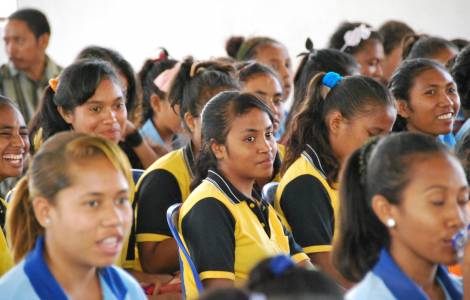
Unfpa
Dili (Agenzia Fides) - Early elections in East Timor is the solution announced by the President of the Republic, Francisco Guterres, to end the political impasse in the country. Prime Minister Mari Alkatiri, in fact, was unable to reach a majority in Parliament, to support his government.
"The decision of a new vote was generally well received by the people and institutions of all social classes: politicians, commentators, analysts, defense forces, simple citizens, even by the Catholic clergy. The president made a key decision that influences people's lives", says in an interview with Agenzia Fides Acación Pinto, a lay Catholic, economist and social scientist scholar, who is involved in the Church and in society. "People appreciated the president’s decision, who acted in respect of popular sovereignty", he adds. "For the first time the country is experiencing early elections. A harmonious interpretation of the provisions that govern the formation of the government is needed. Otherwise, confusion, misunderstanding and conflict are created", says Pinto.
Ermenia Soares Guterres, Catholic teacher at Dili Institute of Technology, told Fides: "What is happening at a political level in East Timor indicates a conflict of interests and a desire for power: the nation is under development and politics is lacking in defending the right of the population. Let us see, what will happen in the future, because the fearful will vote again. Frankly, I am not happy".
Soares Guterres recalls that "Xanana Gusmao (first president and then Prime Minister of East Timor) did his best to defend our maritime border with Australia, as our main source of income comes from the oil shared with Australia. I fear his efforts will be useless: our government is very weak to handle this situation".
The government is implementing its 20-year strategic development plan for 2011-2030, which focuses on revenues from oil exploitation to develop the economy and alleviate poverty.
The elections will be held in 2018, but the date has not yet been set. Given that tensions between rival political groups have grown over the last six months, there are fears of social violence. (SD-PA) (Agenzia Fides, 30/1/2018)